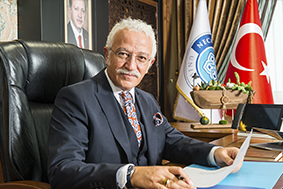What Should Be Done?
The most effective method to find partners is to leverage personal relationships. Academics who have studied abroad within our university can use their advantage by utilizing the connections they have made at the universities they attended to sign Erasmus agreements. In this context, they can reach out to academics from European universities they are familiar with. It is crucial to provide detailed information about our university to these individuals and create opportunities for face-to-face meetings.
Another important step in finding partners is to make personal initiatives at international conferences, meet with representatives from various European universities, introduce our university, and develop relationships within the Erasmus framework.
- Student Mobility - SM: Within the Erasmus program, students (excluding those in their first year of higher education) are provided with 3-12 months of educational support (Erasmus grant) at a university or higher education institution in another participating country based on bilateral agreements and arrangements. Student exchange occurs at associate degree, undergraduate, master's, and doctoral levels. However, exchanges at the undergraduate and master's levels are more common in practice.
For both student and staff exchange, one of the parties in the Erasmus Bilateral Agreement must be from an EU member state. Currently, a department/faculty from Turkey, a non-member country, must have a partner department/faculty from an EU member state. Students who have been approved by their institution for Erasmus participation apply to the institution's international relations office (Erasmus Coordinator's Office) for the next academic term. Based on the bilateral agreements between universities and the total exchange volume and resources, the selection process is carried out by this office according to the criteria set by the Commission and the EU Education and Youth Programmes Centre. Students selected for the exchange will make administrative and financial preparations according to the duration of their stay and the country they are going to.
Students wishing to participate in the program should work on improving their foreign language skills and maintaining a high GPA. Students with a GPA below 2.20/4.00 or 58/100 (for undergraduate students) or 2.50/4.00 or 65/100 (for graduate students) will not be eligible for exchange. The selection for eligible students will be based on academic performance (50%) and foreign language proficiency (50%). Erasmus encourages the improvement of students' academic performance and foreign language skills. Applications are made by the Selection Commissions officially assigned by the Rectorate. If necessary, staff from the National Agency may observe the selection process. Students selected to participate in the program are issued the Erasmus Student Charter, which outlines their rights and responsibilities.
- Teaching Staff Mobility - TS: The Erasmus program supports teaching staff who teach short-term courses as guest lecturers within the official curriculum of a partner university in another European country. The support provided is intended to cover additional expenses arising from teaching in the host country. This exchange can last from 1 week (at least eight hours of lessons) to 6 months. Support for this exchange ranges from 800 to 5000 EUR.
- Organisation of Mobility - OM: The Erasmus program provides support for creating the best conditions for exchange programs in higher education institutions. The goals are as follows:
- Mutual recognition of the period and work carried out by students as guests at institutions in other participating countries.
- Enabling teaching staff to deliver short-term courses (or duties) seamlessly as guest lecturers fully integrated into the academic programs.
- Implementing the European Credit Transfer System (ECTS) and Diploma Supplement (DS).
European Credit Transfer System - ECTS:
The ECTS facilitates student mobility by standardizing course credit transfer across Europe, ensuring that the time spent and work done in the host country is fully recognized by the student's home university. The Erasmus program also supports activities related to the introduction, implementation, or widespread adoption of the ECTS system. ECTS support mechanisms include:
- Initial grant for institutions that have not previously received Erasmus support for ECTS.
- ECTS label for institutions that implement the system properly in all their undergraduate and graduate programs. (While having the ECTS label is not mandatory for student exchanges, universities with this label are considered more prestigious by the EU Commission and countries. It is highly recommended, and universities with this label are listed on the official EU Commission website.)
- ECTS Credit Accumulation Support for institutions wishing to set up mechanisms for accumulating ECTS credits.
- ECTS/DS Advisors and visits when necessary.
Diploma Supplement - DS:
Universities are encouraged to issue a supplementary document that provides details of the degree program and its content, serving as an international diploma. This supplement, particularly in Europe, ensures academic transparency and facilitates employment. It includes the transcript of records and ECTS credits along with standard information about the degree program. While it is currently optional, the Diploma Supplement is likely to become mandatory in the future, as it is already required in many leading European countries.
These agreements can always be made, but it is better if they are done before the Erasmus University Charter is issued to obtain approval for the charter.
If there is no bilateral agreement between departments or faculties, even if the university has the Erasmus University Charter, student or staff exchange cannot be carried out within the Erasmus framework.
- Faculties only include their own departments.
- Agreements are updated regularly, so quotas may change.
- We update agreements on our website on specific days of the week.
- For more detailed information, please contact the Erasmus Coordination Office.







